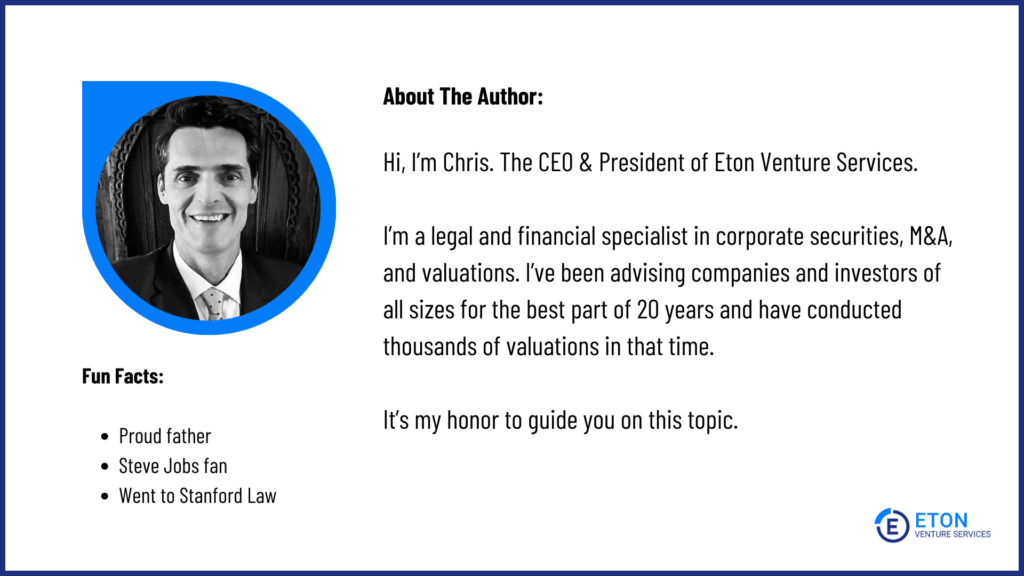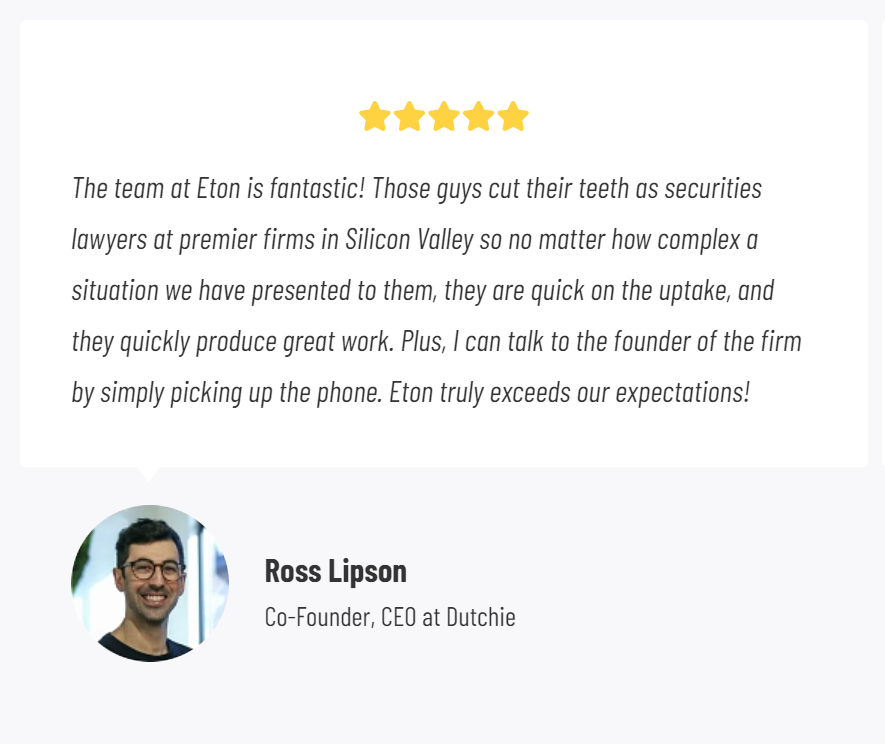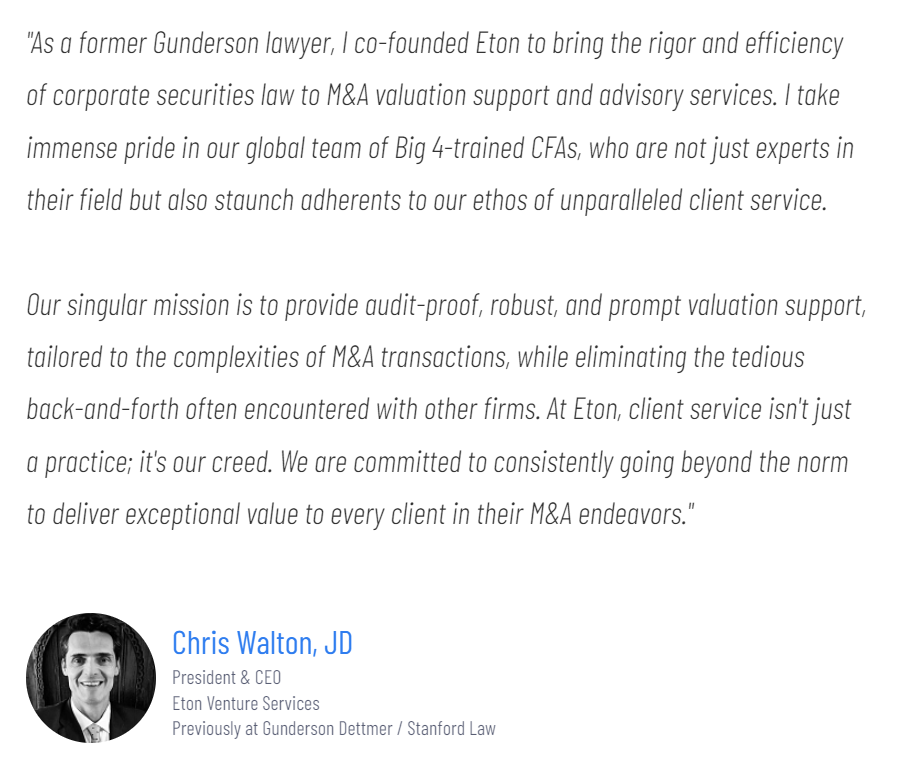Hi, I’m Chris Walton, author of this guide and CEO of Eton Venture Services.
I’ve spent much of my career working as a corporate transactional lawyer at Gunderson Dettmer, becoming an expert in tax law & venture financing. Since starting Eton, I’ve completed thousands of business valuations for companies of all sizes.

Read my full bio here.
💡Below is a breakdown of standard M&A fees. To get specific pricing for our M&A advisory, valuations and transaction opinion at Eton, reach out to us directly here.
Your M&A advisory fee is made up of four possible components.
Those are the:
Which ones, and how much you pay for each, will depend on the advisory firm and the results of your M&A deal.
Your firm will let you know ahead of time which fee types they charge but you can expect to pay at least the retainer and one type of success fee.
Here’s a table breakdown of what you can expect to pay for M&A advisory services based on the deal sizes:
Deal Size | Basic Retainer Fees | Success Fees | Fixed Success Fees | Flat Percentage Success Fees |
≤1MM | $5,000 – $10,000 per month | 7 – 10% | $50,000 – $75,000 | 5% – 10% of the deal value |
$1-10MM | $10,000 – $20,000 per month | 5 – 8% | $75,000 – $200,000 | 3% – 7% of the deal value |
$10-30MM | $15,000 – $30,000 per month | 3 – 6% | $200,000 – $500,000 | 2% – 5% of the deal value |
$30-50MM | $20,000 – $40,000 per month | 2 – 5% | $500,000 – $750,000 | 1.5% – 4% of the deal value |
$50+MM | $25,000 – $50,000 per month | N/A | $750,000 and up | 1% – 3% of the deal value |
📌 Disclaimer: These cost ranges are based on general industry standards and common practices observed in the M&A advisory field. They’re compiled from various industry reports, expert opinions, and standard pricing models that are typically seen across different deal sizes.
Please note that actual costs can vary depending on specific circumstances, such as the advisor’s reputation, the complexity of the deal, geographic location, and industry specifics.
For the most accurate and relevant information, we recommend you consult directly with M&A advisory firms or review the detailed pricing structures listed on their websites.
If the table doesn’t quite make sense to you yet, don’t worry. Below, I go into detail for each fee column.
📚 You might also like: 7 Top M&A Consultants for Hire in 2024
Let’s look at each fee type in turn:
This fee is an upfront payment made to the advisory firm to secure their services and cover initial expenses.
It’s typically a fixed amount or a percentage of the total deal value. Paying this fee helps demonstrate your commitment to the process and ensures the advisor’s availability and dedication from the outset.
The success fee is contingent upon the successful completion of the M&A transaction. It’s often calculated as a percentage of the deal value or as a predetermined amount.
This fee aligns the interests of the advisor with yours, incentivizing them to work diligently to achieve a favorable outcome.
Negotiating the success fee percentage upfront can help clarify expectations and avoid misunderstandings later on.
Some advisory firms may offer a fixed success fee option, where the fee amount is predetermined regardless of the deal size or outcome.
This can provide predictability in terms of costs but may not always align with the level of effort required for more complex or large-scale transactions. Consider discussing with your advisor whether this option suits your specific needs and circumstances.
Alternatively, advisors may charge a flat percentage success fee based on the deal value. This approach can be more flexible than a fixed fee, adjusting proportionally with the transaction size.
However, it’s important to clarify whether there are any caps or minimum thresholds associated with this fee structure to avoid surprises during the negotiation process.
The costs of M&A advisory doesn’t stop at the fees listed above. In fact, there are several other costs you need to consider and budget for depending on your deal.
For example, the larger your deal size, the more people you’ll need to hire to support the process and thus the more you’ll need to pay overall.
Here are some other common factors influencing the price of your M&A advisory:
Appraising intellectual property assets, such as patents, trademarks, copyrights, licenses, and customer lists, are critical components of many M&A transactions.
At Eton, we offer IP valuation services alongside our M&A advisory services to streamline and simplify the M&A process. You can learn more about our IP valuation process here.
As I hinted at before, no two M&A advisory costs are the same. Even the standard fee a firm charges you will vary depending on these four factors:
Let me explain.
It seems counterintuitive but the larger your deal size, the lower your advisory fee will be (barring the influence of the other factors). This is often because the firm will rely on the success fee being larger and thus compensating them well for their time.
Because a small deal size won’t bring as much money in success fees, the firm will offset this by charging a hire advisory fee.
So it’s important to take this into consideration. It doesn’t mean a business with a small deal will pay more overall, it simply means the costs will be distributed to different components.
Geographic location can impact advisory fees due to differences in market competitiveness and regulatory requirements.
As a general rule, urban areas with a high concentration of M&A activity will command higher fees compared to rural regions. So a firm based in New York City will likely charge more than one in the middle of nowhere Delaware.
The more complex your M&A, the more it will cost you. This is because it takes more time, resources, and expertise to advise complex situations.
Some examples of complex transitions include:
Small businesses typically involve lower fees due to simpler organizational structures and financial complexities.
Large corporations, on the other hand, with extensive operations and intricate financial arrangements may have higher fees to accommodate the additional diligence and analysis required.
You can’t hire just anyone to advise your M&A. There’s too much at stake.
After all the outcome impacts more than just you, it impacts both businesses involved, their shareholders, employees, and stakeholders.
You need an M&A advisory firm who will ensure the process is conducted with integrity, minimizing risks such as financial losses, damaged reputations, and legal complications.
So I always recommend companies looking to hire an M&A advisor consider these five things:
A solid reputation speaks volumes about an advisor’s track record and reliability. Look for firms with a history of successful transactions and satisfied clients within your industry.
They often have a testimonial page you can refer to but just as important is what’s said about them privately. Ask your lawyer who they recommend or peers in your industry who have been through an M&A before.
Effective communication and transparency are essential for a smooth M&A process. Choose an advisor who keeps you informed, answers your questions promptly, and provides clear explanations of their strategies and recommendations.
Every M&A transaction is unique, requiring tailored solutions to address specific challenges and objectives.
Seek advisors who take the time to understand your business’s unique needs and goals, offering customized strategies and advice accordingly.
Valuation services are often integral to the M&A process, providing insights into the worth of assets, liabilities, and potential synergies.
Choose an advisor who offers comprehensive valuation services to ensure accurate assessments and informed decision-making.
If you speak to a potential advisor and they’re unclear about pricing or offering a performance based fee, you should proceed with extreme caution.
Here’s why:
Advisors who tie their fees solely to the deal’s outcome may prioritize closing the transaction over acting in your best interests.
Look for transparent fee structures that align with the scope and complexity of the engagement.
Advisors who are evasive or unclear about their pricing structure are likely hiding something that will prove expensive in the long run.
Transparency is key when it comes to fees, so choose an advisor who provides clear and upfront information about their pricing and billing practices.
At Eton, we’re customer obsessed. We know that an M&A outcome isn’t about us, it’s about you, your company, and your people. Every M&A advisory client gets our full attention and expertise—expertise that comes from working at Big 4 firms.
We can also handle other parts of the M&A process such as valuation of your business or intellectual property. This streamlines the work and minimizes unnecessary back and forth between firms.
Our services are bespoke to your needs and I’m always on hand to answer questions and clear concerns at no additional cost to you.

If you want to learn how we can support your M&A with transparency, expertise, and care, get in touch with me here.

Have more questions about M&A advisory fees? I answered them below:
M&A fees are payments made to advisors for their services in managing and facilitating mergers and acquisitions.
These fees vary widely depending on the complexity of the transaction, the customization required, and the specific terms negotiated.
They are often not disclosed upfront due to competitive, confidential, and industry norm reasons, and can include a mix of fixed fees, percentage of the transaction value, or other flexible arrangements.
The average M&A deal fee typically ranges between 1% to 5% of the transaction value.
However, this can vary greatly based on the size and complexity of the deal.
Smaller transactions might see higher percentage fees, while larger billion-dollar deals often have lower percentage fees but result in significant absolute amounts.
A typical M&A advisory process usually takes between 6 months to a year, depending on the complexity of the deal, the readiness of the involved parties, and regulatory requirements.
Some transactions may be completed more quickly if the parties are well-prepared and there are few regulatory hurdles, while others might take longer due to negotiations, due diligence, and integration planning.
The success rate for mergers and acquisitions varies widely, but according to Harvard Business Review, around 50% to 70% of M&A deals fail to achieve their intended goals.
The success depends on various factors, including strategic alignment, cultural integration, and effective post-merger integration.
Successful deals are those that enhance value, achieve synergies, and meet strategic objectives.
Schedule a free consultation meeting to discuss your valuation needs.
Chris Walton, JD, is is President and CEO and co-founded Eton Venture Services in 2010 to provide mission-critical valuations to private companies. He leads a team that collaborates closely with each client’s leadership, board of directors, internal / external counsel, and independent auditors to develop detailed financial models and create accurate, audit-ready valuations.